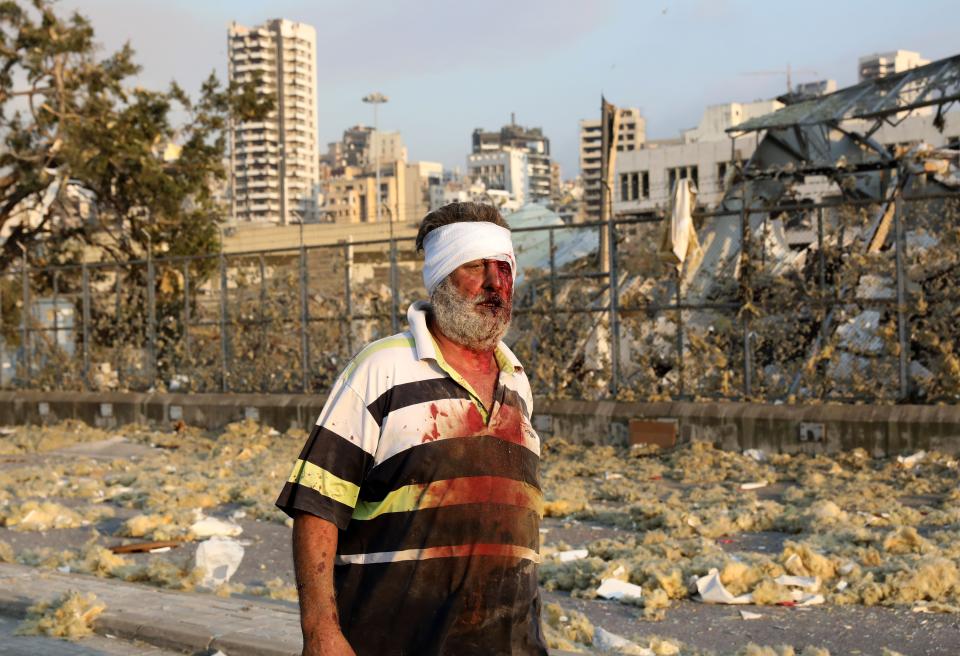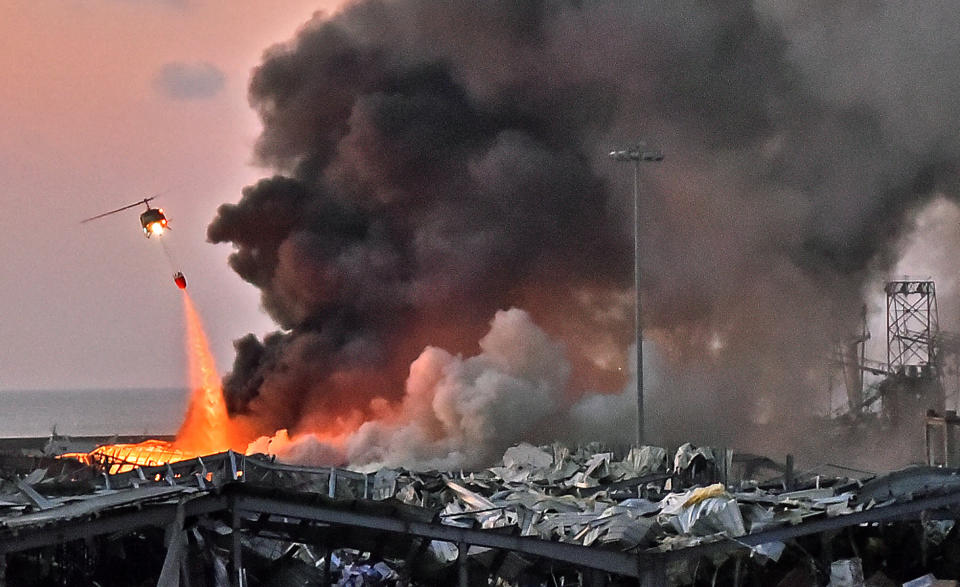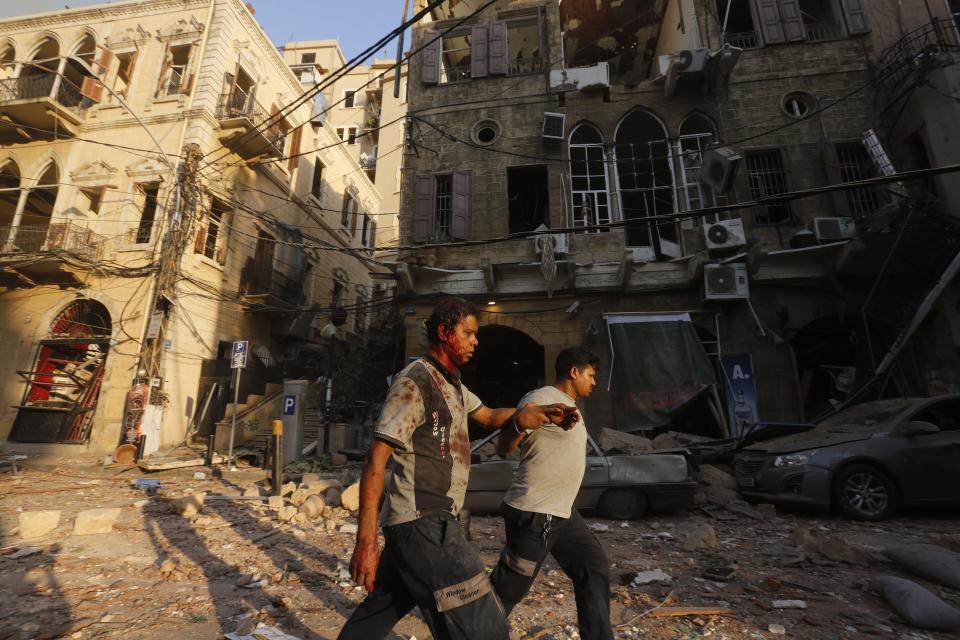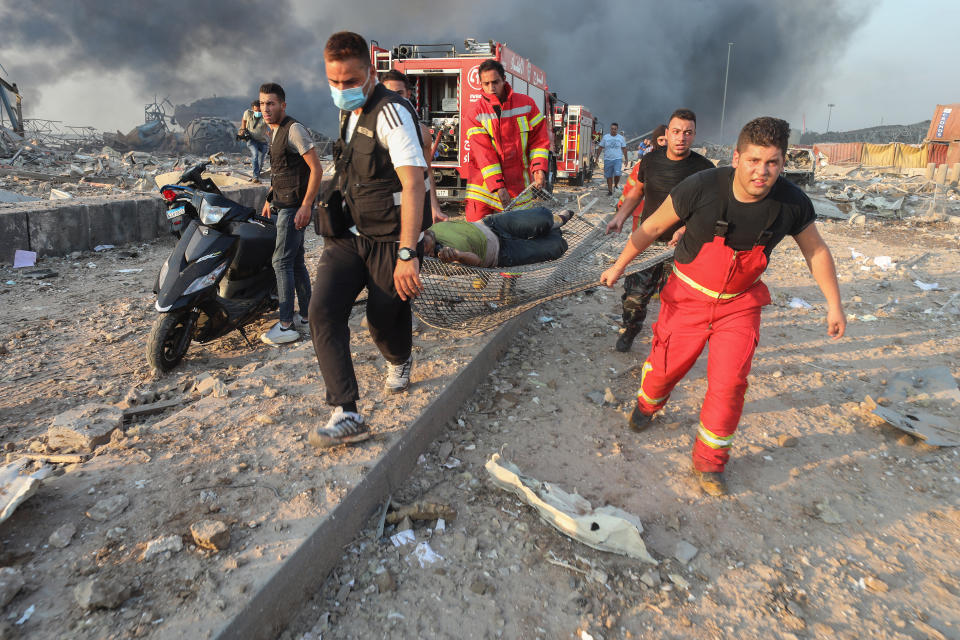Huge Explosions In Beirut Kill At Least 100, Injure Nearly 4,000
Two massive explosions rocked Beirut, the capital of Lebanon, on Tuesday, resulting in widespread damage and casualties, and throwing a country already mired in political and financial distress into further chaos.
Videos posted on social media show the blasts near Beirut’s port, one of the busiest in the eastern Mediterranean. The head of Lebanon’s Red Cross told Reuters at least 100 people had been killed and nearly 4,000 injured.
“It’s like a war zone. I’m speechless,” Jamal Itani, the city’s mayor, told Reuters. “This is a catastrophe for Beirut and Lebanon.”
Officials said they expected the death toll to rise and that the disaster likely caused billions of dollars in damage. The Associated Press reported up to 85% of the country’s grain may have been stored near the sites of the blast, adding to concern about how the country will import goods with its main port destroyed.
Lebanon’s general security chief, Abbas Ibrahim, told local reporters that the initial explosion was not a bombing but was caused by a fire in a warehouse that had been storing confiscated “highly explosive materials.” The second explosion detonated with such force it felt like a 3.5 magnitude earthquake and was heard or felt as far away as Cyprus, according to the AP. Streets around the city were strewn with debris and windows and doors were shattered or blown out miles away.
The Lebanese government said that explosive ammonium nitrate, used in fertilizers but also bombs, had been stored for years in a warehouse where the blast occurred, according to the AP, which the country’s interior minister confirmed.
My brother sent me this, we live 10 KM away from the explosion site and the glass of our bldgs got shattered. #Lebanon pic.twitter.com/MPByBc673m
— Abir Ghattas (@AbirGhattas) August 4, 2020
— Afif Tabish 🇱🇧🇨🇦 (@afif) August 4, 2020
Photos and videos taken in the immediate aftermath showed injured civilians and destroyed buildings. Bodies and debris can be seen on the dust-covered streets near the site of the explosions. One video posted on Twitter showed windows at Beirut Souks, an upscale shopping center, completely blown out.
Beirut’s governor, Marwan Abboud, called the incident a “national catastrophe” and questioned how the country could recover from it.
“I have never in my life seen disaster this big, this grand, this catastrophic,” said Abboud, before breaking down in tears. “This a disaster for Lebanon. … We need to stay strong and we need to be courageous, but this, our people have been through so much.”
Abboud estimated the disaster caused at least $3 billion in damage and displaced roughly 300,000 people. Destruction extended to half the city, he said.
Nazar Najarian, the secretary-general of Lebanon’s Kataeb political party, was killed in the explosions, the state-run National News Agency reported.
Lebanese Prime Minister Hassam Diab said Tuesday that the “dangerous warehouse” had been around since 2014. He said initial reports showed nearly 2,750 tons of ammonium nitrate had been stored in the facility “without precautionary measures being taken.”
“I will not relax until we find the responsible party for what happened, hold it accountable and apply the most serious punishments against it,” Diab said during a televised address. He later said: “I promise you that this catastrophe will not pass without accountability. Those responsible will pay the price.”
Diab declared Wednesday a national day of mourning.
Lebanon’s health minister, Hamad Hasan, told Reuters late Tuesday there were still many residents unaccounted for after the explosions.
“There are many people missing,” he said. “People are asking the emergency department about their loved ones and it is difficult to search at night because there is no electricity.”
#Beirut streets now. pic.twitter.com/8mZSXTLNQI
— Samar Saeed/سمر سعيد (@Samarsaeed) August 4, 2020

President Donald Trump said later Tuesday that the explosion appeared to be “a bomb of some kind,” citing unnamed U.S. military officials he said “seem to think it was an attack.” It’s unclear if that characterization was based on an intelligence briefing or was just the president’s conjecture.
“The United States stands ready to assist Lebanon,” he said during his daily White House coronavirus briefing. “We have a very good relationship with the people of Lebanon, and we will be there to help.”
Lebanon’s health care system is already being outstretched by chronic underfunding and a surge in coronavirus cases. Doctors and nurses for months have warned of a shortage of medical supplies, including anesthesia drugs and sutures, according to the AP. The American University of Beirut Medical Center, one of the most prestigious hospitals in the Middle East, has laid off hundreds of workers in recent weeks.
Some people injured in the explosions were turned away from hospitals because the buildings sustained too much damage or were already at capacity, Agence France-Presse reported. Several hospitals are asking for blood donations to meet an overwhelming need, according to reports.



Tuesday’s blasts came at a complicated time for the country, which is in the midst of its worst economic crisis in decades. The value of its currency plummeted more than 80% in the last year and unemployment has soared, pushing millions of people into poverty.
The crisis began last year, before the coronavirus pandemic hit. Lebanon has long relied on reserves of foreign currency, particularly the U.S. dollar, for essential imports, but political leaders and banks failed to maintain that stock or to develop the economy to produce exports and earn money.
The virus-related global economic slowdown further hurt Lebanon’s economy and slashed inflows of money from Lebanese citizens working abroad.
Last fall, tens of thousands of protesters staged weeks of largely peaceful demonstrations against Lebanon’s ruling elite over its failure to deliver basic services and to prevent the financial crunch. Then-Prime Minister Saad Hariri resigned in response.
Lebanon’s political system is deeply fractured, particularly along ethnic and religious lines, a legacy of French colonialism that is now preserved in the country’s laws and has produced years of open conflict, notably a civil war between 1975 and 1990.
On Friday, a United Nations-backed tribunal supported by Washington is set to rule on whether members of the powerful Lebanese militia and political group Hezbollah assassinated Rafiq Hariri, Saad’s father and himself a former prime minister, in 2005. The expected decision has increased the risk that tensions between Hezbollah and other factions could turn violent.
Hariri, a wealthy member of the Sunni Muslim community, is aligned with the U.S. and its regional partners like Saudi Arabia. The country’s military — which is one of the few Lebanese factions that includes members of nearly all of the country’s various ethnic and religious groups — receives significant American support.
Zainab Hijazi, a 23-year-old dental student in Beirut, was home when the explosion first occurred and shook her building. She saw dense smoke from her balcony.
“Our country can’t bear anything right now being in the midst of a financial crisis and the COVID-19 outbreak and now we’re on the verge of a war,” Hijazi told HuffPost. She said she plans to leave her home in southwest Beirut within the next two days out of safety precautions.
Nick Visser contributed reporting.
Love HuffPost? Become a founding member of HuffPost Plus today.
This article originally appeared on HuffPost and has been updated.

 Yahoo Movies
Yahoo Movies 
